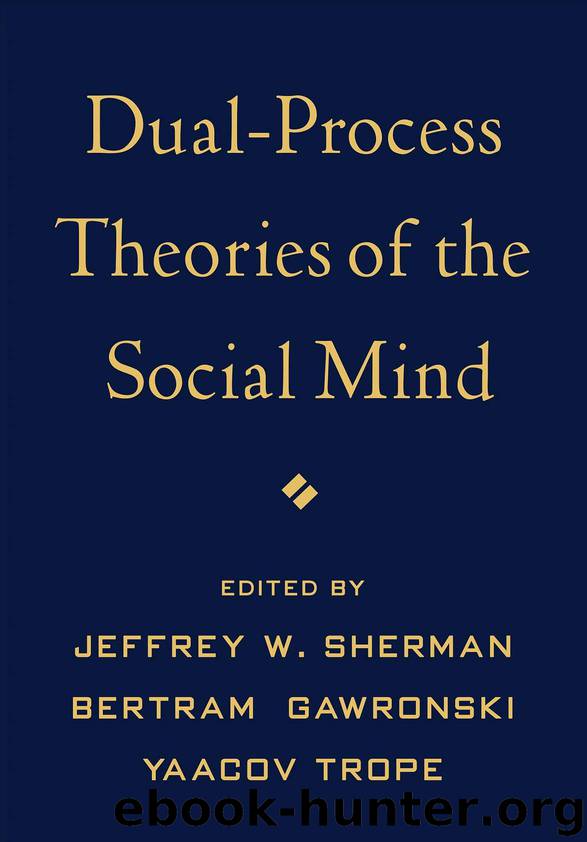Dual-Process Theories of the Social Mind by Unknown

Author:Unknown
Language: eng
Format: epub
ISBN: 9781462514458
Publisher: Guilford Publications
Published: 2014-05-28T00:00:00+00:00
Declarative and Experiential Information in Truth Perceptions
Information that is considered valid and reliable exerts more influence on judgment and behavior, independent of whether the information is recalled from memory or received from someone else. In making these assessments, people attend to a limited set of criteria, usually a subset of what might be considered the “Big Five” of truth assessment. In what follows, we review research suggesting that each of these “Big Five” can be formed based on either declarative or experiential inputs.
One criterion is social consensus: If many people believe it, then there is probably something to it (Festinger, 1954). Accordingly, people are more confident in their beliefs when the beliefs are shared by others (e.g., Newcomb, 1943; Visser & Mirabile, 2004), are more likely to endorse a message when many others have done so before them (Cialdini, 2009), and trust their memories of an event more when others remember it in similar ways (e.g., Ross, Buehler, & Karr, 1998). Conversely, perceiving dissent reliably undermines message acceptance, which makes reports on real or fabricated controversies an efficient strategy for swaying public opinion (Lewandowsky, Ecker, Seifert, Schwarz, & Cook, 2012). To assess the extent of consensus, one can draw on declarative information by consulting survey data or asking friends, potentially weighting one’s friends’ opinions by their expertise. Alternatively, one may simply rely on how “familiar” the belief feels. Because one is more frequently exposed to widely shared beliefs than to highly idiosyncratic ones, the apparent familiarity of a belief provides a (fallible) experiential indicator of its popularity. Hence, the mere repetition of a belief can increase perceived social consensus even when all repetitions come from the same, single source, making a single repetitive voice sound like a chorus (Weaver, Garcia, Schwarz, & Miller, 2007).
A second criterion is whether the belief is consistent with other things one believes. This can be assessed analytically by checking the information against other knowledge, which requires motivation and cognitive resources, as observed in many studies in the tradition of cognitive response approaches to persuasion (Petty, Ostrom, & Brock, 1981). A less demanding indicator is again provided by one’s metacognitive experiences and affective responses. Information that is inconsistent with one’s beliefs is processed less fluently (Winkielman, Huber, Kavanagh, & Schwarz, 2012) and elicits negative feelings (Festinger, 1957), an assumption shared by many theories of cognitive consistency (Abelson et al., 1968; Gawronski & Strack, 2012). Accordingly, declarative as well as experiential inputs can indicate whether a given proposition is consistent with other things one believes.
A third criterion is that a given piece of information is also more likely to be accepted as true when it fits a broader story that lends coherence to its individual elements, as observed in basic research on mental models (for a review, see Johnson-Laird, 2012) and extensive analyses of jury decision making (Pennington & Hastie, 1992, 1993). Coherence can be determined through a systematic analysis of the relationships between different pieces of declarative information. Alternatively, it can be assessed by attending to
Download
This site does not store any files on its server. We only index and link to content provided by other sites. Please contact the content providers to delete copyright contents if any and email us, we'll remove relevant links or contents immediately.
I Capture the Castle by Dodie Smith(2038)
The Heavy by Dara-Lynn Weiss(1810)
Aspergirls by Rudy Simone(1699)
Be Different by John Elder Robison(1650)
Autism's False Prophets by Paul A. Offit(1539)
My Child's Different by Elaine Halligan(1517)
Smart but Scattered—and Stalled by Richard Guare(1501)
101 Tips for the Parents of Boys with Autism by Ken Siri(1495)
Asperger Syndrome (Autism Spectrum Disorder) and Long-Term Relationships by Ashley Stanford(1427)
What's Making Our Children Sick? by Michelle Perro(1416)
ADHD by Mark Selikowitz(1394)
Girlish by Lara Lillibridge(1389)
On Immunity: An Inoculation by Biss Eula(1362)
An Adult with an Autism Diagnosis by Gillan Drew(1355)
Nerdy, Shy, and Socially Inappropriate by Cynthia Kim(1352)
Animal-assisted Interventions for Individuals with Autism by Temple Grandin(1332)
The Cities by K.A Knight(1317)
Sarah's Child (Hqn Romance) by Linda Howard(1314)
Seeing Ezra by Kerry Cohen(1307)
